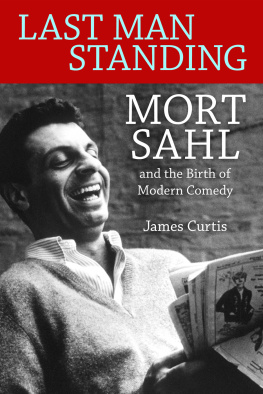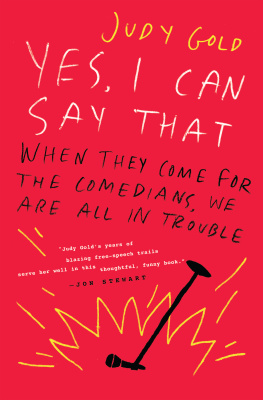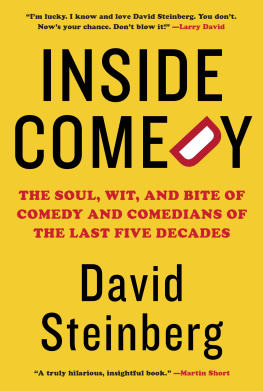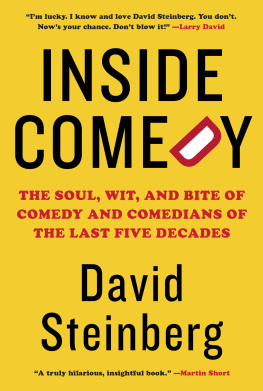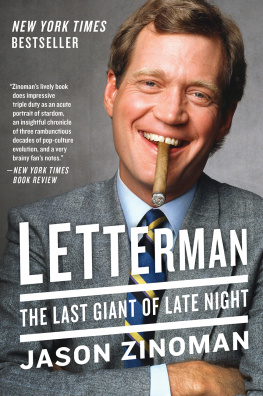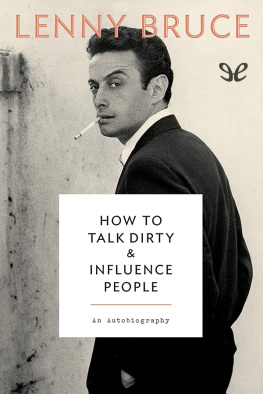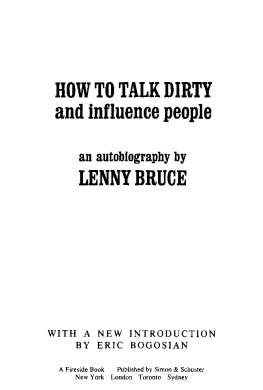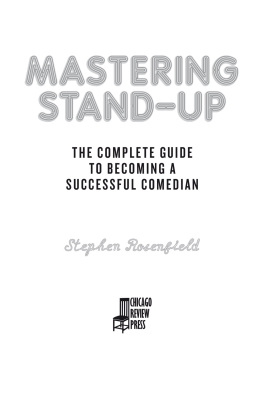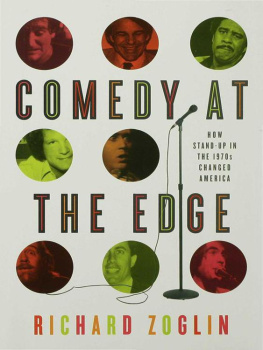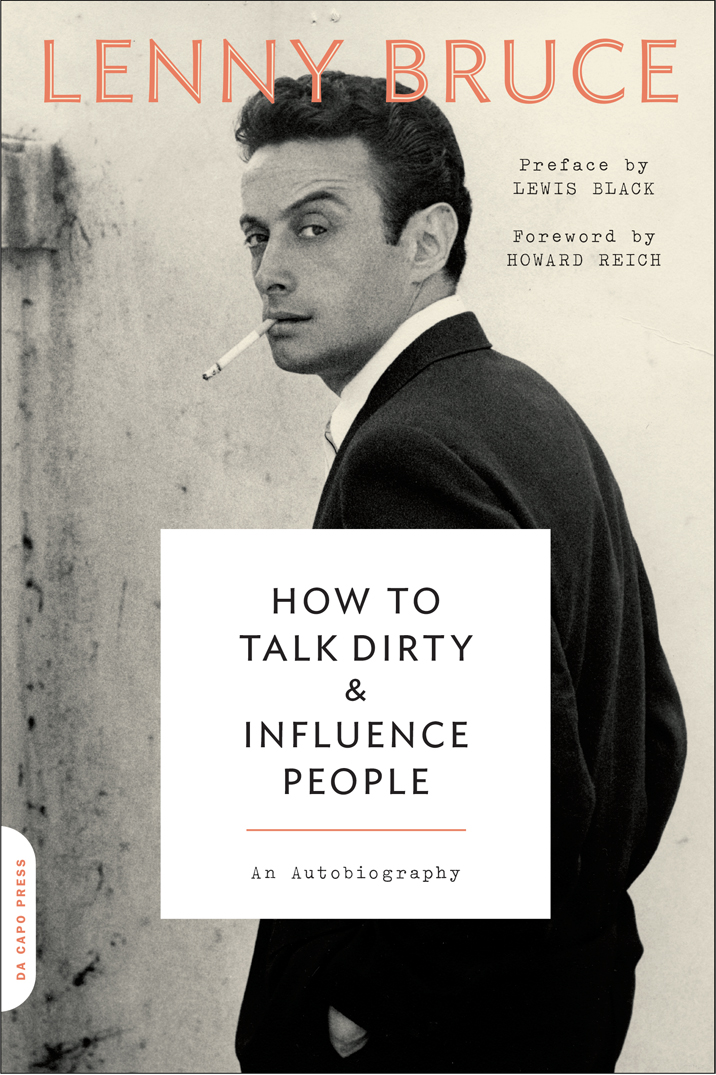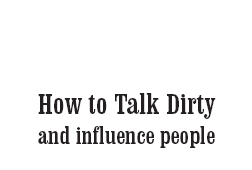

A portion of the proceeds from this book will go directly to the Lenny Bruce Memorial foundation, a 501(c)(3) not-for-profit.
Copyright 2016 by Kitty Bruce
Preface copyright 2016 by Lewis Black
Foreword copyright 2016 by Howard Reich
First published by Playboy Enterprises, Inc. in 1965
All rights reserved. No part of this publication may be reproduced, stored in a retrieval system, or transmitted, in any form or by any means, electronic, mechanical, photocopying, recording, or otherwise, without the prior written permission of the publisher. Printed in the United States of America. For information, address Da Capo Press, 44 Farnsworth Street, Third Floor, Boston, MA 02210.
Cataloging-in-Publication data for this book is available from the Library of Congress.
ISBN: 978-0-306-82530-9 (e-book)
Published by Da Capo Press,
an imprint of Perseus Books, a division of PBG Publishing, LLC, a subsidiary of Hachette Book Group, Inc.
www.dacapopress.com
Da Capo Press books are available at special discounts for bulk purchases in the U.S. by corporations, institutions, and other organizations. For more information, please contact the Special Markets Department at the Perseus Books Group, 2300 Chestnut Street, Suite 200, Philadelphia, PA 19103, or call (800) 810-4145, ext. 5000, or e-mail .
10 9 8 7 6 5 4 3 2 1
I dedicate this book to all the followers of Christ and his teachings; in particular to a true ChristianJimmy Hoffabecause he hired ex-convicts as, I assume, Christ would have.
Table of Contents
Guide
Contents
I wish I could remember when I first heard of Lenny Bruce. It may have been from The Realist, a magazine he wrote for. I do remember asking my dad about him. He had seen him perform. He thought he was very funny. So I read his book in my teens, and I would never be the same. Like Vonnegut, Joseph Heller, Dick Gregory, and later George Carlin and Richard Pryor, it fed a growing rebellious streak in me. He was funny, irreverent, and his scathing attacks on organized religion, politics, the death penalty, race, and the ways in which we have chosen to live made me laugh and made me think. It changed the way I looked at life. And it planted the seed in my angry brain that would eventually lead me to a career expressing my own dissatisfaction with the world. He took me to places I hadnt imagined possible. Im asked occasionally if Im trying to change peoples minds with my comedy and I always say I dont think about changing minds; I think about getting laughs. Changing a mind is collateral damage if you will. Im sure thats the way Lenny saw it. But Lenny wasnt just getting laughs; he was getting arrested for his jokes.
He was considered a dirty comic because he used dirty words (many of the ones Carlin made famous). I didnt consider them dirty words; I thought they were adult words. As Ive discovered, lots of people still consider them dirty, and back when Lenny was tossing them about they were considered even dirtier. The bad words, as some folks still stupidly believe, didnt get him the laughs, his jokes did. It was the words that got him locked up. They were an excuse to punish him. The real reason he was deemed a threat was because his comedy went too far for the times, way too far. Even now, in many parts of this country, fifty some odd years later, in the twenty-first century no less, some of his routines would be seen as going too far. He didnt just push the boundaries; he obliterated them. His comedy was beyond edgy; it was shocking. Its one thing to say what people are thinking but afraid to say. Its another to say things that up until that time had been unthinkable, let alone speak them aloud.
This book gives us a solid context of what Lenny lived through and what he had to face. (And to think today we complain about the politically correct environment that makes comedy difficult? Are you kidding me?) We are talking about not even being able to tell your jokes without the threat of imprisonment.
Lennys comedy is important because he is one of those who transitioned us from the family friendly comedy of the time to the comedy of improvisation, honesty, and the deeply personal. He put it all on the line. Lenny confronted and challenged his audience with hard dark truths wrapped in twisted scenarios of his own invention. It took insanity, courage, and geniusand not necessarily in that orderto look for laughs in corners where no one had looked before.
There isnt a comic who has worked since Lenny who doesnt owe him a debt of gratitude. Every time someone swears on a stage or runs counter to the prevailing thoughts of the time, it is because Lenny kicked the door down. (And Mr. Carlin made sure it stayed open.)
Enough of my bullshit, read the fucking book. Youll be glad you did.
LEWIS BLACK
New York City, April 2016
Lewis Black is a New York Times-bestselling author, stand-up comedian, actor, and playwright. Besides appearing regularly on The Daily Show (in his own segment, Back in Black), he has written and starred in a string of successful HBO and Comedy Central specials and one-man Broadway shows. He has won two Grammys, an Emmy and the American Comedy Award for Funniest Male Stand-up Comedian. He lives in New York City.
Constant, abrasive irritation produces the pearl: it is a disease of the oyster. Similarlyaccording to Gustave Flaubertthe artist is a disease of society. By the same token, Lenny Bruce is a disease of America. The very existence of comedy like his is evidence of unease in the body politic. Class chafes against class, ignorance against intelligence, puritanism against pleasure, majority against minority, easy hypocrisy against hard sincerity, white against black, jingoism against internationalism, price against value, sale against service, suspicion against trust, death against lifeand out of all these collisions and contradictions there emerges the troubled voice of Lenny Bruce, a night-club Cassandra bringing news of impending chaos, a tightrope walker between morality and nihilism, a pearl miscast before swine. The message he bears is simple and basic: whatever releases people and brings them together is good, and whatever confines and separates them is bad. The worst drag of all is war; in didactic moments Bruce likes to remind his audience that Thou shalt not kill means just that. Although he occasionally invokes Christ as source material, I think he would applaud a statement recently made by Wayland Young, an English writer and agnostic, in a book called Eros Denied:
Christian and post-Christian and Communist culture is a eunuch; pornography is his severed balls; thermonuclear weapons are his staff of office. If there is anything sadder than a eunuch it is his balls; if there is anything more deadly than impotence it is murder.
If it is sick to agree with that, then God preserve us from health.
This may be the time to point out the primary fact about Bruce, which is that he is extremely funny. It is easy to leave that out when writing about himto pass over the skill with which he plays his audience as an angler plays a big-game fish, and the magical timing, born of burlesque origins and jazz upbringing, that triggers off the sudden, startled yell of laughter. But he is seldom funny without an ulterior motive. You squirm as you smile. With Bruce a smile is not an end in itself, it is invariably a means. What begins as pure hilarity may end in self-accusation. When, for example, he tells the story of the unhappily married couple who achieve togetherness in the evening of their lives by discovering that they both have gonorrhea, your first reaction is laughter; but when you go on to consider your own far-from-perfect marriage, held together (it may be) by loveless habit or financial necessity or fear of social disapprovalall of which are motives less concrete and intimate than venereal diseaseyour laughter may cool off into a puzzled frown of self-scrutiny. You begin to reflect that there are worse fates than the clap; that a curable physical sickness may even be preferable, as a source of togetherness, to a social or spiritual sickness for which no cure is available. And thus another taboo is dented.


